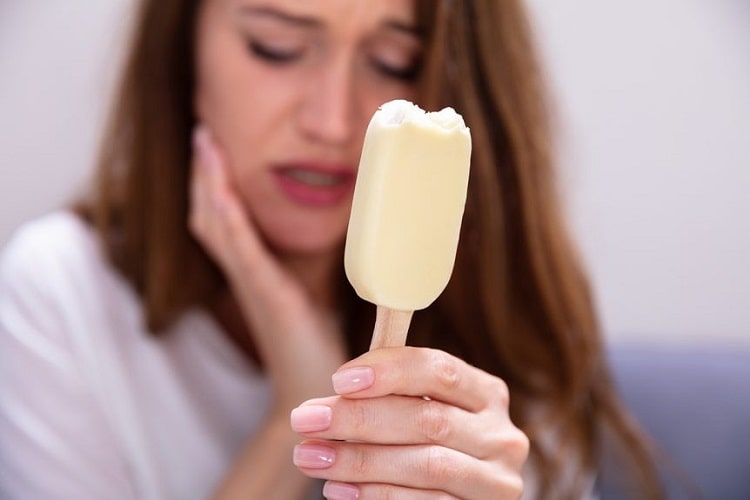One tooth sensitive to cold ( comprehensive guide to causes )

Our teeth are not evolutionarily designed to eat very cold foods. Until a hundred years ago, in the absence of industrial and home refrigerators, people did not have access to very cold foods. Humans never consumed food such as ice cream or ice in the four seasons.
Most of the food was used at room temperature, so problems such as tooth sensitivity were not common! Large temperature changes can be harmful to your tooth.
Tooth sensitivity is a common problem in modern society. Some people don"t consider sensitive teeth to be a big problem, but some people are bothered by this problem and start looking for treatment for it. (88% of dentists believe that tooth sensitivity has an adverse effect on the quality of life of those suffering from this condition.)
• Causes of dental sensitivity
Tooth sensitivity can have various causes, which we will discuss in this article.
• Pickles and acidic foods
Acidic foods such as pickles, lemons, etc. can dissolve and destroy a layer of your tooth enamel, thus making your teeth sensitive. Avoid chewing acidic fruits like lemons and wash your mouth immediately after consuming them.
• Dental cracks
The presence of cracks that are not visible to the eye on your teeth can make them sensitive. Cracks can occur spontaneously, due to impact or breaking hard objects or wrong habits such as chewing ice, breaking and crushing food and hard objects with the teeth. Some cracks need treatment.
• Brushing with the wrong method
Brushing with the wrong method or using an inappropriate toothbrush can damage the health of the teeth. Brushing with high pressure and with horizontal strokes along with the use of hard toothbrushes will thin your tooth enamel and make your teeth sensitive.
Brushing the wrong way also causes your gums to recede and exposes the roots of your teeth to food at different temperatures.
• Caries or repairs close to the nerve
The presence of a filling on the tooth can cause some degree of sensitivity for that tooth. In the presence of caries and fillings near the nerve, because there are no protective layers of the dental pulp (nerve) against thermal changes, the teeth become more sensitive.
• Dental wear
Teeth wear (grinding teeth) can have different causes. Including nervous problems, pulling teeth, teeth grinding, and even the presence of parasites in the body. Loss of enamel and dentin due to wear exposes teeth to sensitivity.
• Dental treatments
Dental treatments such as fillings and teeth whitening can make them sensitive. Teeth whitening may cause sensitivity to some degree. (its prevalence is high and is between 55 and 75 percent) but this sensitivity is usually temporary and resolves.
Periodontal (gum) treatments such as gum surgery can also have the side effect of tooth sensitivity. The sensitivity after tooth filling usually disappears after a while. But sometimes the continuation of this sensitivity causes the need for root treatment (nervectomy).
• Treatment of dental sensitivity
Treatment of tooth sensitivity is sometimes technically simple. The most common treatment for cold teeth recommended is the use of anti-allergic toothpastes. Other treatments in the dental office can be performed on your teeth and remove or reduce tooth sensitivity. (anti-allergic treatment in the office, fluoride therapy, gum transplant, etc.).
The last step for the treatment of excessive and troublesome dental sensitivity is root canal treatment (nervectomy), which is rarely needed.



